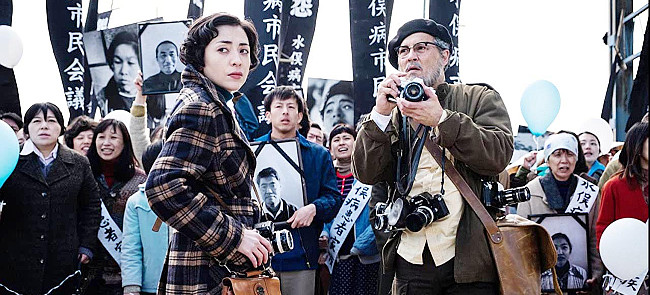| SHADOWS ON THE WALL | REVIEWS | NEWS | FESTIVAL | AWARDS | Q&A | ABOUT | TALKBACK | |||||
|
Minamata
Review by Rich Cline |
| |||||
 dir Andrew Levitas scr David K Kessler, Stephen Deuters, Andrew Levitas, Jason Forman prd Sam Sarkar, Bill Johnson, Andrew Levitas, Johnny Depp with Johnny Depp, Hiroyuki Sanada, Jun Kunimura, Minami, Bill Nighy, Ryo Kase, Tadanobu Asano, Akiko Iwase, Katherine Jenkins, Nikaru Inagawa, Lily Robinson, Aaliyah Reign release UK 13.Aug.21, US 11.Feb.22 20/UK 1h55 


BERLIN FILM FEST Is it streaming? |
 Based on real events, this drama gives Johnny Depp one of his meatiest roles yet, playing famously gruff war photojournalist W Eugene Smith as his life takes an unexpected turn. Filmmaker Andrew Levitas tells this story with skill, balancing the personal journey with more urgent elements. Although the low-key approach oddly undermines the genuinely involving events, the film raises awareness of an important issue that carries on today. In 1971 New York, Eugene (Depp) has become a recluse, alienating his Life magazine editor Robert (Nighy) with his erratic behaviour. Then he's approached by Aileen (Minami), who asks him to document the effects of toxic waste in the coastal city of Minamata, Japan. Eugene convinces Robert to secretly send him to cover the situation for the magazine. And he spends three years there, becoming part of the community. The images he captures reveal the horrific human cost of corporate and political greed, as well as the tenacity of families as they fight the system. Most interesting is how this story is framed as Eugene's last chance to make up for the messy life he has created, while dealing with both alcoholism and trauma from past assignments. This allows the grim facts to have a visceral impact, seen through Eugene's eye as he makes personal connections with people. The film is finely designed and directed, although the sound mix lets it down, as important Japanese dialog is interpreted on-screen by the whispering, often inaudible Aileen. Subtitled scenes are much sharper. In a finely textured performance, Depp finds earthy depth in Eugene's booze-hazed persona, conveying emotion without sentimentality, largely because he's unaware that he's inspiring people around him. His scenes with Minami are well-played on a range of engaging levels, although their romance is underdeveloped (in real-life they were already a couple). The cast is packed with first-rate actors in key roles, including Sanada as a fiery activist, Kunimura as a slippery corporate boss, and Asano and Iwase as parents grappling with their daughter's illness. While there are some intense scenes along the way, most notably in the depiction of heavy-handed policing, the narrative momentum is far too gentle for its own good, as the film often becomes extremely quiet and still. Sequences that should be thrilling or moving play out with very little energy. But Eugene's compelling photographs are recreated in ways that bristle with yearning compassion, reminding us of the power of a clear, honest image.
R E A D E R R E V I E W S 
 Still waiting for your comments ... don't be shy.
Still waiting for your comments ... don't be shy.
|
||||
© 2022 by Rich Cline, Shadows on the Wall | |||||
| HOME | REVIEWS | NEWS | FESTIVAL | AWARDS | Q&A | ABOUT | TALKBACK | |||||

